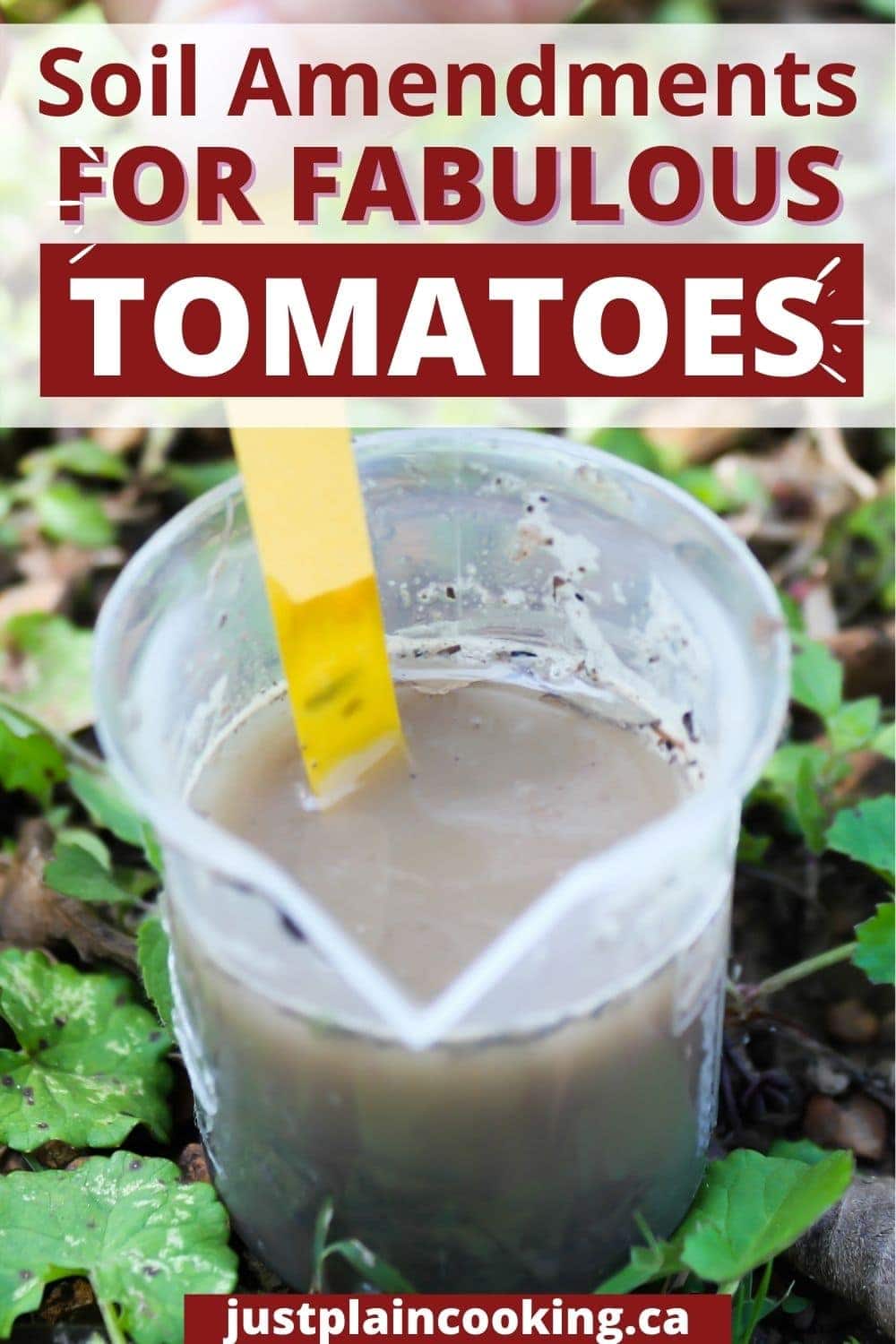
Some small but vital soil amendments for tomatoes allow you to get the best, biggest, and healthiest tomato crop in your neighborhood.
Your Soil Probably Needs Amending
My eldest son was a toddler, and I decided that I was going to plant a garden.
With a handful of seed packets in one hand and a little garden trowel in the other, I headed out to our little backyard in south Ottawa.
My parents had always had a garden and it sure seemed simple – spring arrived and they put seeds in the dirt …. and later that summer, we had vegetables.Getting the sod removed turned out to be a much bigger job than I expected, especially since I was doing it with a hand trowel, but I persevered, knowing that I'd find rich garden soil right underneath. What I found was …. rocks and clay.
Still, no one has ever called me a quitter, and I was determined to put in a garden! The internet was in its infancy, my parents were a long-distance call away, and … yup, I was running blind, and doing so at full speed.
I chiseled away at that rock and clay until I had a place to put seeds.
I had planted a garden.
As you might guess, nothing really grew. The broccoli grew long stems devoid of florets, the lettuce couldn't make it past the rocks, and the tomatoes? Well, they made an appearance before throwing in the towel and dying.
You're NOT going “plant a garden” like that, are you? First, you're going to plan your garden carefully and then you're going to pay attention the vital steps.
But most importantly, you're going to honour what your plants need. And right now, we're going to talk about what your tomatoes need.
If you are going to invest the time, money and energy to grow tomatoes, you’ll want to get the best possible results for your efforts.
I'll assume that, as you researched the vegetables you wanted to grow, you came upon the idea of soil amendments for tomatoes. Tomato soil amendments are important because truthfully none of us has naturally perfect soil.
Learning to amend your soil properly is the difference between having the leggy, unproductive excuse of a garden that I first grew and proudly hauling in your winter's tomatoes from the abundance of your garden.
At first glance, however, this topic can appear very complicated. So let’s start by looking at some basic facts.
The primary goal of amending your soil is to improve its composition by either adding in missing nutrients or minimizing negative elements. It sounds complicated, but it's not too hard to figure out. Once you do figure out the appropriate soil amendments, you can create an ideal soil environment for your plants to thrive.
Test Your Soil

To get started, you’ll want to test your soil in order to establish a baseline starting point.
Kits like this let you determine the exact pH level of your soil. Yes – you can probably send it off to a lab and have it checked, but this method is far less expensive!
This is a really important step, because if your soil is either too alkaline or too acidic, your plants' ability to absorb the proper nutrients from the soil will be inhibited. When your soil’s pH level is out of whack, it won’t matter how much fertilizer you add later because your plants won’t be able to access the nutrients you are trying to provide.
When testing the pH level of soil, a reading of 7.0 is considered neutral.
Tomatoes, like most vegetables, are happiest when the soil is slightly on the acidic side.
A reading of 6.0 – 6.8 is ideal for tomatoes. When your soil falls in this range, all those important nutrients, such as nitrogen, phosphorus, calcium, potassium, iron, and manganese can be properly absorbed by your tomato plants.
If you find that your pH is not ideal after testing your soil, you’ll want to add different amendments to correct the problem.
Know Your pH
The exact amendments you choose will depend on whether you are trying to move up or down the pH scale and on what’s available in your geographic location.
Acidic Soil
As a general rule of thumb, if your soil is too acidic, you can add limestone or lime to raise the pH to an acceptable range. However, you’ll want to be careful not to over-lime your soil if you go that route.
Alkaline Soil
On the other hand, organic mulches, sphagnum peat, elemental sulfur, or aluminum sulfate are effective amendments for lowering the alkalinity of soil. You might want to talk to a county extension agent or Master Gardener before determining what amendments to use and in what quantities for your location.
Missing Nutrients

For enhancing the nutrient levels in your soil, you’ll also find some beneficial soil amendments right in your own kitchen.
Creating your own organic compost pile is a great way to feed your garden all season long.
Eggshells, banana peels, organic plant-based kitchen scraps and coffee grounds are excellent ways to add potassium, phosphorus, calcium and other natural nutrients to your soil.
Don't forget that there are some things that should never go into your compost – like meat and printed paper!
Eggshells, in particular, are a great way to add more calcium to your soil. It is important for your tomato plants to get sufficient amounts of this particular nutrient in order to avoid the dreaded blossom end rot. Just make sure you clean the empty shells thoroughly before adding them to your garden – otherwise they'll stink and attract unwanted pests.
Soil amendments for tomatoes are NOT scary, strange things that are difficult to figure out. Most of them are simple and easy to find.
No comments:
Post a Comment